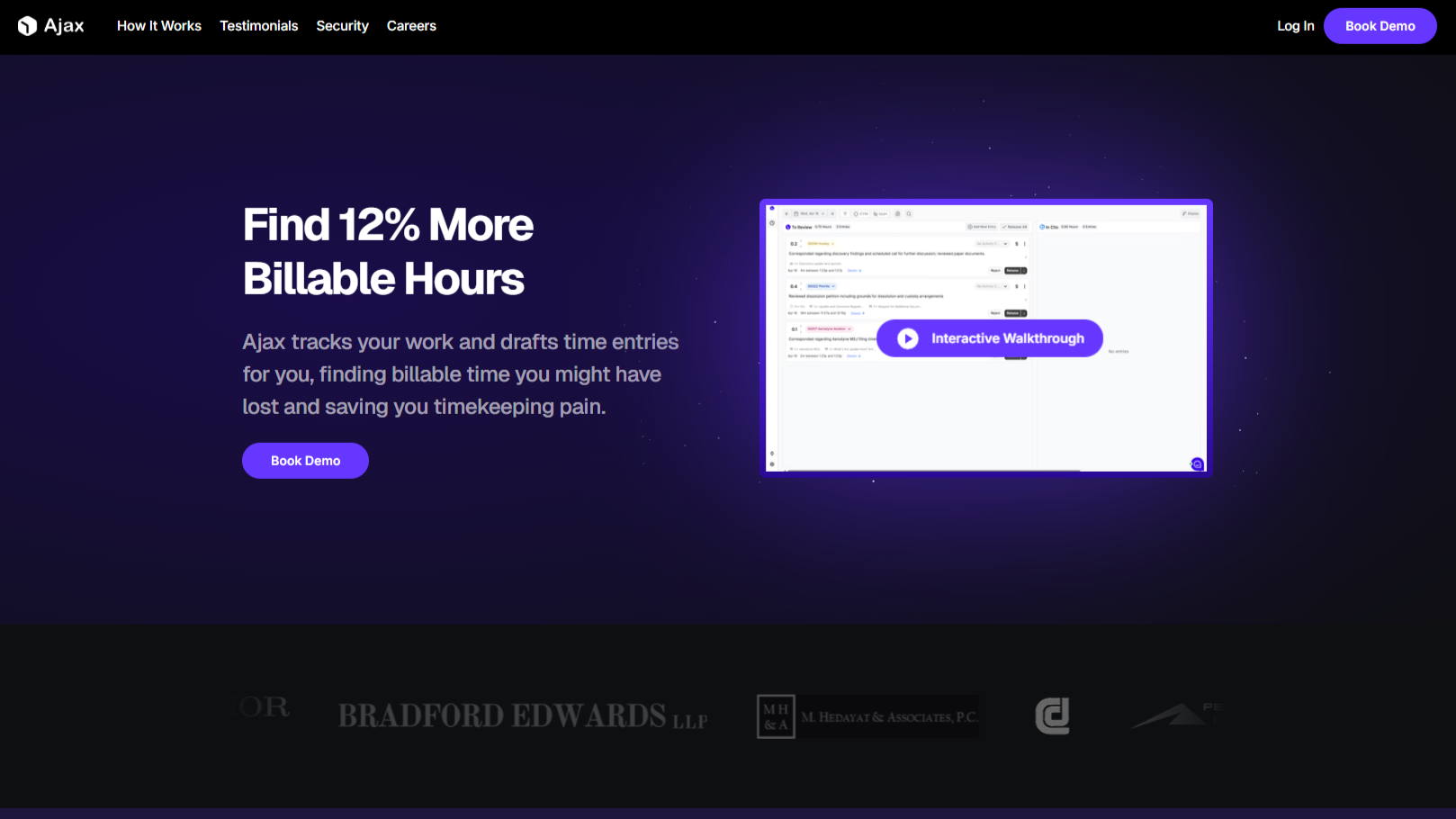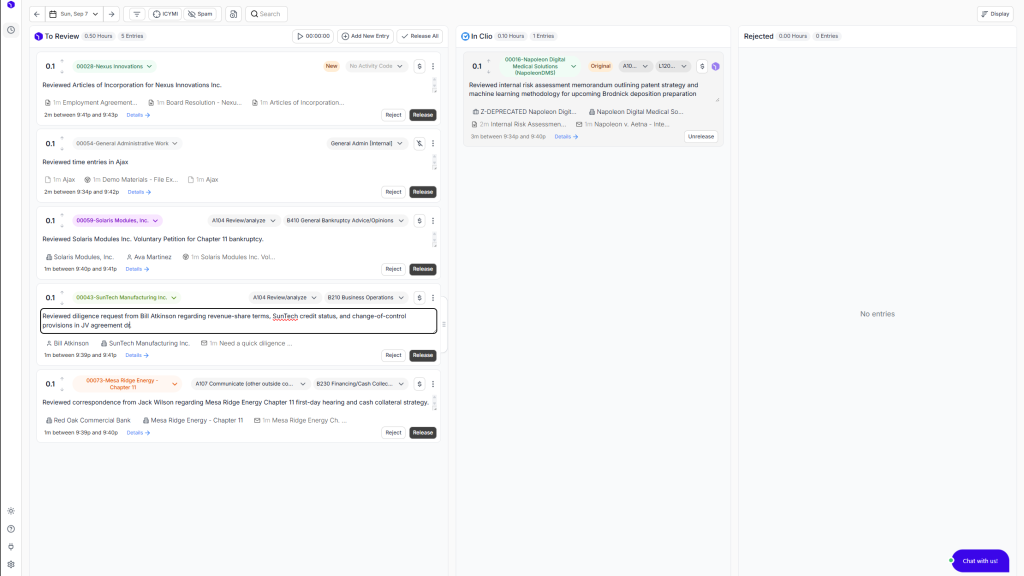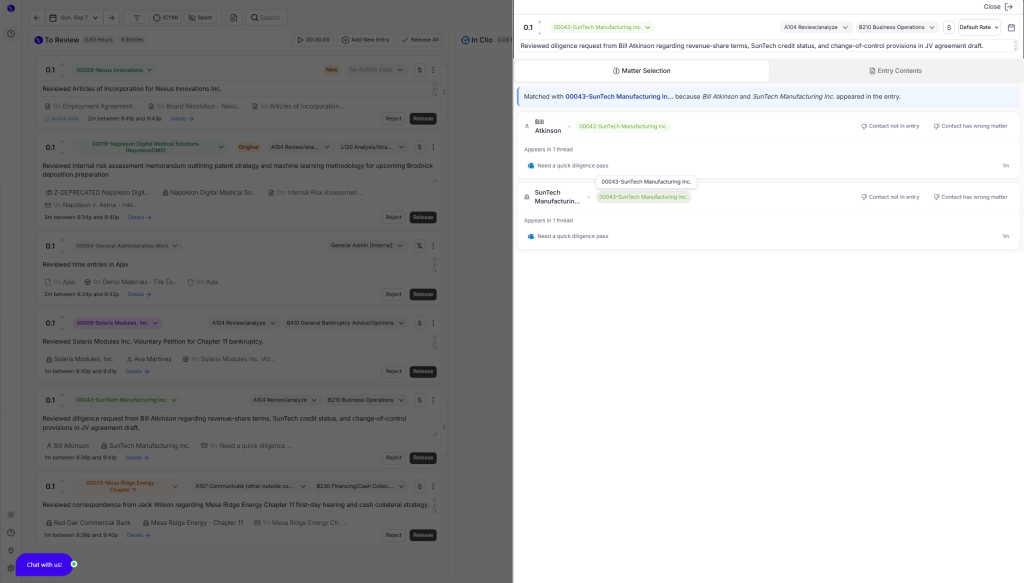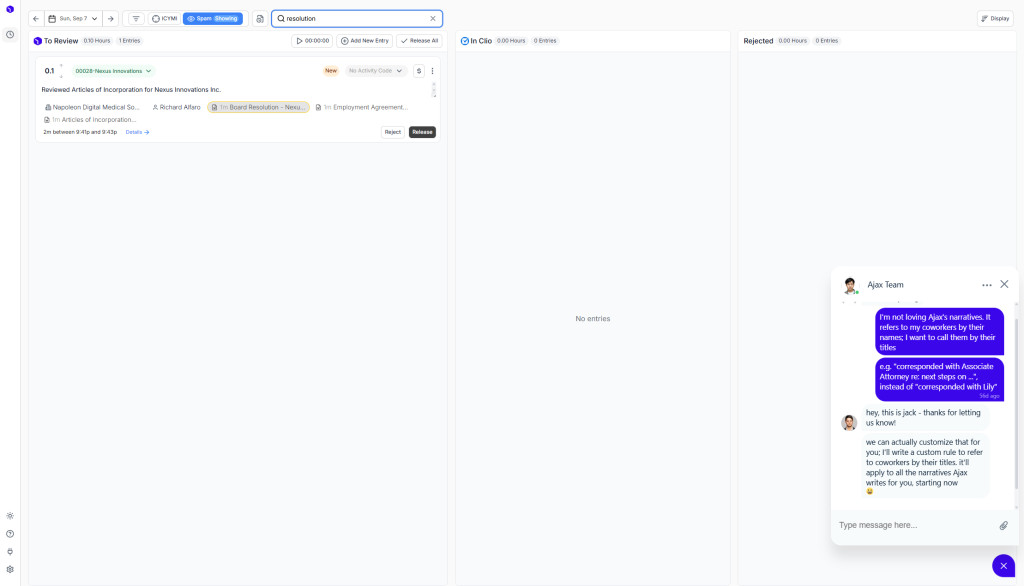The problem of legal timekeeping is as old as the billable hour itself. Lawyers either interrupt their work to record time contemporaneously, breaking their flow and concentration, or they reconstruct their time retroactively, inevitably missing billable work and resulting in weaker narratives for clients.
Enter Ajax, an AI-powered time-tracking platform that aims to solve this age-old dilemma through what co-founder Jack Weinberger calls “the smart approach” – continuously monitoring everything lawyers do on their devices and automatically generating polished time entries in real-time.
Founded in 2022 by brothers Jack and Alex Weinberger, both children of lawyers who grew up hearing their parents complain about the pain of timekeeping, Ajax seeks to alleviate that pain by comprehensively capturing billable time without requiring lawyers to think about it.
The company reports that customers are seeing significant increases in captured billables – with some case studies showing 42% to 61% upticks in recorded hours.
They are also highly satisfied with the product, says Weinberger, who shared with me a number of testimonials.
Beyond Screen Scraping
Ajax is far from alone in seeking to address this problem – there are a number of other applications on the market that provide passive or automated timekeeping for legal professionals.
But what distinguishes Ajax from some of the others is its use of AI to make sense of the data it collects. While some passive timekeepers rely on simple pattern matching to identify client work – looking for email addresses or document names that match existing matters – Ajax takes a more sophisticated approach.
The system uses a native application that, with user permission, tracks whatever the lawyer is doing in whatever window is currently active on the screen. This method allows Ajax to capture work across any application, from email and documents to web research and case management.
Ajax also tracks activity on mobile devices, including when using applications such as calendar, email, and phone systems.
“Every single part of a lawyer’s work, if it touches their phone or computer, is captured,” Weinberger said during a demo of the product.
Not only does the system track the content of what lawyers are viewing, but it also correlates and aggregates activities across different applications and time periods to create cohesive time entries.
Semantic Understanding
Rather than relying on basic keyword matching to process this information, the platform uses large language models to understand semantic connections between activities throughout a lawyer’s day.
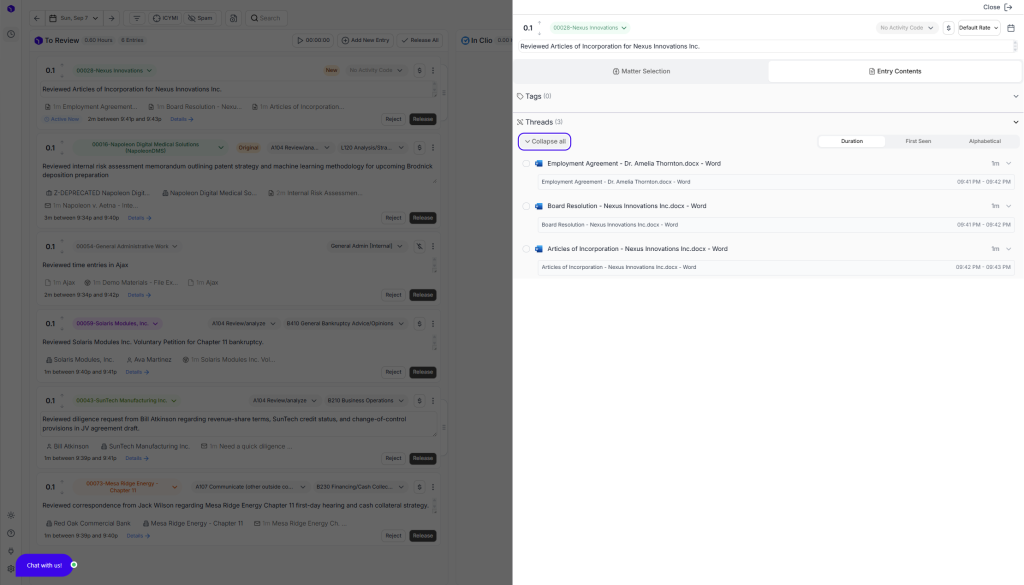
A pane with entry contents and timestamps shows how users can click into any entry to see exactly what programs they were in and when.
In our demo, Weinberger showed how the system handles a scenario that might stump traditional timekeepers: an email mentioning only first names “Dale” and “Ken” with no other identifying information.
When the lawyer subsequently searches for “Dale Heuer” on LinkedIn, Ajax connects these activities and identifies that both relate to the same client matter – even determining that the work concerns “Infosync Services” based on information found during the research, even though that company name never appeared in the original email.
From those scattered activities that a lawyer performs throughout the day – activities that traditional systems would record as separate, disconnected events – Ajax then goes on to pull them together and create unified time entries.
Real-Time Generation
In a recent upgrade, Ajax rebuilt the platform’s back end to virtually eliminate latency in generating time entries, taking it from five minutes to 30 seconds or less. Weinberger recommends that users keep the Ajax interface open in a side tab so they can watch entries populate as they work.
The upgrade also added a Kanban-style board with columns for reviewing entries, released entries that have been synced to the billing system, and rejected entries. Lawyers can edit narratives inline, adjust time allocations, merge related entries with click-and-drag functionality, and sync everything to their practice management system with a single click.
And what about when you do not want to be tracked, such as when you are handling personal matters? The system has a pause function, and Weinberger says people use it frequently.
The Competitive Landscape
AI-powered timekeeping is fast becoming an increasingly crowded space, with several companies competing for lawyers’ business.
Weinberger divides competitors into categories: legacy passive timekeepers like WiseTime and Time Miner that rely on basic pattern matching; established players like Laurel that primarily serve large law firms; and newer AI-focused entrants like Billables AI and Point One.
Probably the largest of the lot is Laurel, but Weinberger contends that its development before GPT-4 came along resulted in a “labor-intensive” product that requires lawyers to review 50-75 activities per day, compared to Ajax’s 10-20 daily entries.
For newer competitors, Weinberger’s critique centers on the absence of native applications. “Not having a native app definitely creates some holes in what you’re able to capture,” he said, suggesting that API-only approaches miss too much lawyer activity.
Focus On Mid-Sized Firms
Ajax is focusing its marketing and sales on mid-sized law firms using Clio, particularly those with 20 to 150 timekeepers. Weinberger argues this “sweet spot” is underserved and represents firms large enough to see significant ROI from improved time capture but small enough to adopt new technology quickly.
The company reports strong traction within this target market. In recent months, Weinberger claims Ajax hasn’t lost a pilot in three months, maintains a 97 % conversion rate from pilots to paying customers in 2025, and has won head-to-head competitions against competitors. The company has also completed a recent funding round, though details remain confidential.
“We had a pilot kickoff last week where we had 25 people come on. I checked this morning and 22 of them logged in so far today on Monday,” Weinberger noted, emphasizing sustained user engagement as a key differentiator.
Privacy and Security
Given that Ajax monitors all screen activity, privacy represents a critical concern. The company addresses this through several mechanisms: data is automatically deleted monthly, there’s no cross-visibility between users at the same firm, and the company has completed SOC 2 Type I compliance.
“Your data is your own – not your firm’s, not your clients’,” the company’s website states. “You alone choose what to release to your billing system.”
The system also includes privacy filters and allows users to pause tracking entirely when needed.
Measuring ROI
A recent case study discusses Ramage Law Group, which ran a head-to-head pilot against another AI timekeeping app. According to Weinberger, Ajax “won hands-down.”
Reportedly, the firm added $1.7 thousand in monthly billables per timekeeper – a $20 thousand annual increase per timekeeper. That represents a 12 times return on the firm’s investment for the software, he said.
Weinberger estimates that small- and mid-sized firms are typically losing $50-150 thousand a year due to partner time lost to poor timekeeping.
The Bottom Line
Ironically, as companies such as Ajax attempt to eliminate manual time entry entirely through comprehensive activity monitoring and AI interpretation, it raises a question about the future of timekeeping itself.
If AI can accurately capture and categorize legal work, it could provide unprecedented visibility into how legal work actually gets done. That, in turn, may lead to broader adoption of alternative fee arrangements – and the eventual demise of the very problem Ajax seeks to solve, hourly time tracking.
But for the time being, Ajax and others of its ilk are betting that the billable hour remains sufficiently entrenched that improving its accuracy and reducing its administrative burden represents a significant market opportunity.
 Robert Ambrogi Blog
Robert Ambrogi Blog